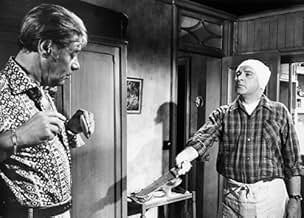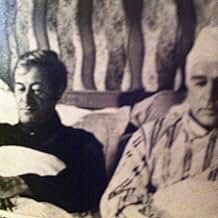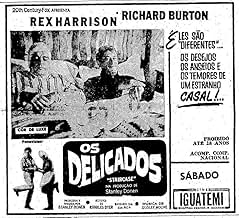NOTE IMDb
5,3/10
993
MA NOTE
Harry et Charlie, deux homosexuels, vivent en couple. Tandis que Harry se sent vieillir et délaissé par Charlie, ce dernier est empêtré dans ses démêlés avec la justice, qui l'accuse d'incit... Tout lireHarry et Charlie, deux homosexuels, vivent en couple. Tandis que Harry se sent vieillir et délaissé par Charlie, ce dernier est empêtré dans ses démêlés avec la justice, qui l'accuse d'incitation à la débauche.Harry et Charlie, deux homosexuels, vivent en couple. Tandis que Harry se sent vieillir et délaissé par Charlie, ce dernier est empêtré dans ses démêlés avec la justice, qui l'accuse d'incitation à la débauche.
- Réalisation
- Scénario
- Casting principal
Michael Rogers
- Drag Singer
- (as Rogers)
Royston Starr
- Drag Singer
- (as Starr)
Katya Wyeth
- Undetermined Secondary Role
- (non crédité)
Avis à la une
This was a poor play,so naturally it made a poor movie.The casting was amiss. Harrison and Burton were two of the centuries finest actors, but, also two of the centuries most notorious womanizers, Harrison tries his best but manages only to give a few honest moments. Burton does not even accomplish that much. a total homosexual stereotype that would be more appropriate to a farce. Cathleen Nesbitt as Burton's mother gives the only honest portrayal in the film.But why blame the actors? It all boils down to the direction. a director is the controlling force of a film. if he could not evoke honest portrayals it rest on his head. ( AND THE AUTHOR.). a waste of talent in a poor production.
Hollywood went slumming into the gay demimonde of London with the 1969 film "Staircase". The result was a fascinating mess becoming one of the worst films ever to come out of the latter part or the end of the 1960's. Producer-Director Stanley Donen(whose work includes working with stars like Audrey Hepburn and Cary Grant in "Charade"),had started out to make a small film about the human need for relationships in even the most desperate times. With the casting of Richard Burton and Rex Harrison as aging gay lovers,however,it turned into the kind of Hollywood tribute to "the little people" that inevitably comes off phony. There was too much talent involved in this film not display moments of insight,but as a whole the picture left audiences wondering just who was the intended audience for it. And furthermore,who would have thought that two of the greatest actors in the history of film cinema---Richard Burton("Cleopatra","Who's Afraid Of Virginia Woolf?", "Becket"),and Rex Harrison("The Ghost and Mrs. Muir","Cleopatra","My Fair Lady",and Doctor Doolittle")stoop to a piece of dung like this to even knowing that their careers would be jeopardize by this?
However,Stanley Donen must have felt the same way after seeing the original London production starring Paul Scofield and Patrick Magee. When "Staircase" came out in 1969,and with the decline in film censorship,Hollywood was opening up to films about the subject of homosexuality. Whereas previous literary properties with gay or lesbian characters had been avoided or "straightened out" by the big studios. By the late 60's,such prominent works as D.H. Lawrence's novella "The Fox",Carson McCullers' "Reflections In A Golden Eye",and John Herbert's play "Fortune and Men's Eyes",not to mention the stage version of "The Killing of Sister George" were all brought to the screen with a certain degree of faithfulness. In that spirit,20th Century-Fox agreed to take on the film version of "Staircase". The result was one of the biggest mistake Richard Burton and Rex Harrison ever did,resulting in becoming one of the worst films of the year,since "Staircase" came out in around Christmas of 1969. Along with it the bad reviews this movie received especially by some critics who blame director Stanley Donen for making Burton and Harrison exploitations of a sideshow attraction. To make things even worst getting stage veterans Cathleen Nesbitt and Beatrix Lehmann as the strong supporting mothers was probably the best part of the whole movies,since they actually stole the show. The rest of it was a bonafide mess. Check it the musical score composed by Dudley Moore-- yes,that Dudley Moore(from the "10" and "Arthur" movies).
However,Stanley Donen must have felt the same way after seeing the original London production starring Paul Scofield and Patrick Magee. When "Staircase" came out in 1969,and with the decline in film censorship,Hollywood was opening up to films about the subject of homosexuality. Whereas previous literary properties with gay or lesbian characters had been avoided or "straightened out" by the big studios. By the late 60's,such prominent works as D.H. Lawrence's novella "The Fox",Carson McCullers' "Reflections In A Golden Eye",and John Herbert's play "Fortune and Men's Eyes",not to mention the stage version of "The Killing of Sister George" were all brought to the screen with a certain degree of faithfulness. In that spirit,20th Century-Fox agreed to take on the film version of "Staircase". The result was one of the biggest mistake Richard Burton and Rex Harrison ever did,resulting in becoming one of the worst films of the year,since "Staircase" came out in around Christmas of 1969. Along with it the bad reviews this movie received especially by some critics who blame director Stanley Donen for making Burton and Harrison exploitations of a sideshow attraction. To make things even worst getting stage veterans Cathleen Nesbitt and Beatrix Lehmann as the strong supporting mothers was probably the best part of the whole movies,since they actually stole the show. The rest of it was a bonafide mess. Check it the musical score composed by Dudley Moore-- yes,that Dudley Moore(from the "10" and "Arthur" movies).
Playful, occasionally moving, often funny comedy about a gay hairstylist and his lover/business partner living in London, an aging couple going on 30 years together who each jab at the others' ego like two bitchy woodpeckers--but who consistently lean on each other (and feed off each other) like two halves of the same person. Richard Burton and Rex Harrison were reportedly unhappy making this film, but they do manage to get a rhythm going that is rather infectious. Charles Dyer adapted his own "intimate" British play--and was probably reeling once his quaint, humble material got blown up on the big screen with major stars--yet his theatrical and literary pretensions are worked out charmingly, and some of his lines get big laughs. There are times when Burton seems more apt to go the distance personally with his character than Harrison is; then, in the very next scene, they flip and it's Harrison who takes off. The "plot" doesn't amount to much (Harrison's Charlie must attend court after being caught in lascivious garb at the same moment his estranged daughter is planning a visit), but to director Stanley Donen's credit the focus of the piece seldom wavers--we never even meet the daughter, which in this case is a blessing. The gay text is not handled madly or foolishly; Donen pairs the scenes down to quick, efficient little episodes, and this keeps the pacing brisk and gives the lead performances a nice edge (we never tire of them). Much ballyhoo was made over two heterosexual stars "camping it up" on screen, but I saw very little swishing. Dyer gets a few dramatic moments perfectly right, and he's written some good lines (such as when Harrison tells Burton, "I need someone new now and then"). The finer sequences are not trampled on by Donen, nor by his editor. "Staircase" is pithy and beguiling and should resonate with audiences who don't mind a tentative mix of sassy humor, self-pity, impatient wisecracks, and a tearing down of vanity. **1/2 from ****
While the film in general, and actors Burton and Harrison in particular, were an embarrassment to all involved; it was based on the play by Charles Dyer which played in London's West End and on Broadway to great success. The stage version was about 180 degrees removed from the film version. The Broadway production of "Staircase" starred Eli Wallach and Milo O'Shea, and was directed by Barry Morse. Barry Morse said the following about the stage play: "It was one of the first productions to show truthful - but at the same moving and funny - portrayals of gay life. The film version was damaging to the text of the play, which was written in a very perceptive and sensitive way. It wasn't meant to be played as if it was some flagrantly exaggerated review sketch."
Burton and Harrison mince, preen, prance, and flounce about the screen in a horrendous display of bad acting. This movie would set gay rights back a century if it weren't so badly made and badly dated. One must wonder what made it a hit on Broadway at the time. The score is an especially abysmal atrocity by Dudley Moore. All those involved (especially Donen) should be ashamed.
Le saviez-vous
- AnecdotesSir Rex Harrison reportedly hated this movie.
- Citations
Charles Dyer: I feel like a whore at a choir boy's orgy.
- Crédits fousThe credits are repeated over and over, getting smaller at the top of the screen to give the image of a staircase.
- ConnexionsFeatured in Sneak Previews: Changing Attitude Toward Homosexuality in Movies (1982)
- Bandes originalesStaircase
(uncredited)
Written by Dudley Moore and Stanley Donen
Performed by Michael Rogers and Royston Starr (as Rogers & Starr)
[The drag performers perform the song prior to the opening title and credits, and again during the end credits]
Meilleurs choix
Connectez-vous pour évaluer et suivre la liste de favoris afin de recevoir des recommandations personnalisées
- How long is Staircase?Alimenté par Alexa
Détails
Box-office
- Budget
- 6 370 000 $US (estimé)
Contribuer à cette page
Suggérer une modification ou ajouter du contenu manquant

























